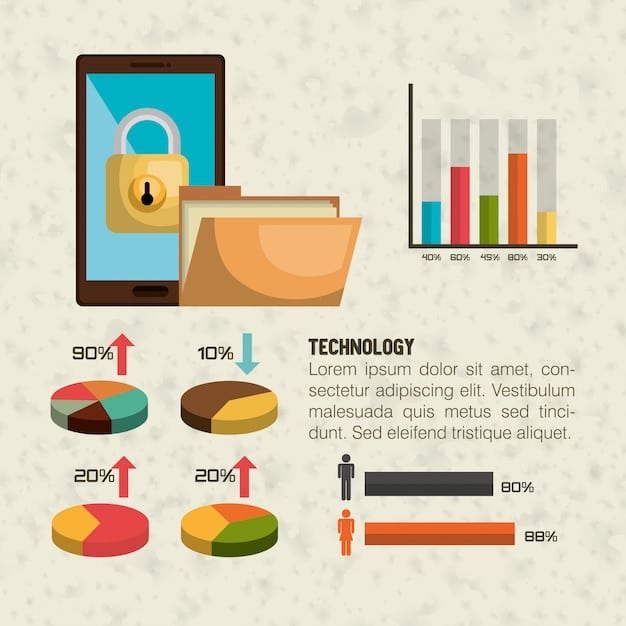Crypto Wallets for US Investors: Your Guide to Safe Choices

Crypto wallets are essential for US investors to securely manage their digital assets; selecting the right one requires careful consideration of security features, supported cryptocurrencies, and ease of use.
For US investors venturing into the world of cryptocurrencies, choosing the right crypto wallet is a critical first step. A secure and reliable wallet is not just a place to store your digital assets; it’s your shield against potential threats and a cornerstone for building a successful crypto portfolio. Understanding the nuances of different wallet types and their security features is paramount for protecting your investments. This guide will help you navigate the options and make informed decisions.
Understanding Crypto Wallets: A Primer for US Investors
Before diving into the best options, it’s essential to grasp the fundamentals of crypto wallets. They’re not physical wallets like you’d carry cash in, but rather digital interfaces that allow you to interact with the blockchain and manage your cryptocurrencies. Essentially, they hold the private keys that control access to your digital assets.
It’s important to recognize that different types of crypto wallets have distinct security profiles. Hardware wallets, for example, are considered the most secure because they store your private keys offline. Software wallets, on the other hand, offer convenience but require more vigilance in terms of security practices.

Types of Crypto Wallets Available
Choosing the right wallet hinges on understanding the available options. Here’s a breakdown:
- Hardware Wallets: Physical devices that store your private keys offline, offering the highest level of security.
- Software Wallets: Applications on your computer or smartphone that store your private keys, offering convenience but requiring careful security practices.
- Web Wallets: Accessed through a web browser, these wallets store your private keys online, making them convenient but potentially more vulnerable to attacks.
- Paper Wallets: A printed-out piece of paper containing your private and public keys, offering offline storage but requiring careful handling.
Each type caters to varying degrees of technical expertise and risk tolerance. It’s critical for US investors to assess their individual needs and priorities before making a selection.
In conclusion, understanding the fundamentals of crypto wallets and the different types available is vital for US investors navigating the crypto space. By carefully considering your security needs and technical proficiency, you can choose a wallet that best protects your digital assets.
Key Security Features to Look for in a Crypto Wallet
Security should be paramount when selecting a crypto wallet. Since cryptocurrencies are irreversible, the responsibility of protecting your assets falls squarely on your shoulders. Therefore, prioritizing wallets with robust security features is non-negotiable.
A reputable wallet should offer features like two-factor authentication (2FA), multi-signature support, and encryption. These measures add layers of protection against unauthorized access and mitigate the risk of losing your funds to cyber threats.
Essential Security Measures
- Two-Factor Authentication (2FA): Requires a secondary verification method (e.g., a code from your phone) in addition to your password, making it harder for hackers to access your wallet.
- Multi-Signature Support: Requires multiple approvals to authorize a transaction, adding a layer of security by preventing single-point compromises.
- Encryption: Protects your private keys by converting them into an unreadable format, making it difficult for unauthorized parties to decipher them.
- Regular Security Audits: Wallets that undergo regular security audits from reputable firms demonstrate a commitment to identifying and addressing potential vulnerabilities.
Regularly updating your wallet software is also critical. Updates often include patches for newly discovered vulnerabilities, making it essential to keep your wallet up to date to protect against potential attacks.
In short, prioritizing security features like 2FA, multi-signature support, encryption, and regular security audits is essential for US investors seeking to protect their crypto assets. Implementing these measures will reduce the risk of unauthorized access and ensure a safer experience.
Top Crypto Wallets for US Investors in 2024
With a plethora of options available, narrowing down the best crypto wallets can feel overwhelming. To simplify the process for US investors, let’s explore some of the top contenders based on their security features, ease of use, and supported cryptocurrencies.
Ledger and Trezor are widely regarded as leading hardware wallet providers, known for their robust security and support for a vast array of cryptocurrencies. These wallets store your private keys offline, making them highly resistant to online threats.

Recommended Wallets
- Ledger Nano X: A popular hardware wallet known for its security and support for a wide range of cryptocurrencies, as well as Bluetooth connectivity.
- Trezor Model T: Another reputable hardware wallet offering similar features to Ledger, with a touchscreen interface and support for various cryptocurrencies.
- Exodus: A software wallet with a user-friendly interface and support for numerous cryptocurrencies, suitable for beginners.
Always conduct thorough research and choose a wallet that aligns with your priorities. Consider factors like security features, supported cryptocurrencies, ease of use, and compatibility with your devices.
Ultimately, identifying the top crypto wallets involves carefully evaluating your priorities, conducting thorough research, and considering factors like security features, supported cryptocurrencies, and ease of use. By making an informed choice, US investors can safeguard their digital assets with confidence.
Understanding the Risks and How to Mitigate Them
Investing in cryptocurrencies comes with inherent risks, and crypto wallets are not immune to these challenges. It’s crucial for US investors to be aware of potential threats and implement proactive measures to mitigate them.
While hardware wallets offer superior security, they are not foolproof. Users must still take precautions against phishing attacks and ensure they store their recovery phrases securely. Software wallets, on the other hand, are more susceptible to malware and hacking attempts, making it crucial to follow best practices for security.
Common Risks and Mitigation Strategies
A combination of vigilance, education, and proactive security measures can significantly reduce the risk of falling victim to cyber threats.
- Phishing Attacks: Be wary of suspicious emails, websites, or messages that attempt to trick you into revealing your private keys or seed phrase.
- Malware: Install reputable antivirus software and avoid downloading software from untrusted sources to prevent malware infections.
- Lost or Stolen Devices: Always password-protect your devices and enable remote wipe capabilities in case of loss or theft.
- Poor Password Hygiene: Use strong, unique passwords for your crypto wallets and enable two-factor authentication whenever possible.
Remember, no crypto wallet is entirely immune to risks. By acknowledging these challenges and implementing proactive mitigation measures, US investors can better protect their digital assets from harm.
In essence, understanding the risks associated with crypto wallets and implementing effective mitigation measures is crucial for US investors to protect their digital assets. Vigilance, education, and proactive security practices will help you navigate the crypto landscape with confidence.
Compliance and Regulatory Considerations for US Investors
Navigating the regulatory landscape is critical for US investors using crypto wallets. Understanding the compliance requirements and reporting obligations can help you avoid potential legal issues and ensure you’re conducting your activities within the bounds of the law.
The IRS (Internal Revenue Service) considers cryptocurrencies property, meaning they are subject to capital gains taxes. It’s essential to keep accurate records of your crypto transactions, including purchase dates, sale dates, and the fair market value of the assets at the time of the transaction. This information is needed to accurately calculate your tax liabilities.
Navigating Regulatory Requirements
- Tax Reporting: Accurately report your crypto earnings and losses on your tax returns, using forms such as Form 8949 and Schedule D.
- KYC/AML Compliance: Many crypto exchanges and wallets require users to undergo Know Your Customer (KYC) and Anti-Money Laundering (AML) verification processes to comply with regulations.
- State-Specific Regulations: Be aware of any state-specific regulations related to cryptocurrencies and crypto wallets, as these can vary significantly.
Staying informed about regulatory changes and consulting with a tax professional can help you navigate the complex world of crypto compliance and ensure you’re on the right side of the law.
In summary, navigating compliance and regulatory considerations is essential for US investors using crypto wallets. Keeping accurate records, staying informed about regulatory changes, and consulting with a tax professional will help you meet your legal obligations and avoid potential legal issues.
Future Trends in Crypto Wallet Security
The landscape of crypto wallet security is constantly evolving. As technology advances and cyber threats become more sophisticated, it’s vital for US investors to stay abreast of emerging trends in wallet security.
Multi-party computation (MPC) wallets, for example, are gaining traction as a way to enhance security by distributing private keys across multiple parties, making it more difficult for hackers to compromise them. Similarly, biometric authentication methods, such as fingerprint and facial recognition, are becoming increasingly common as an additional layer of security.
Staying informed about these trends and investing in wallets that embrace cutting-edge security measures can significantly improve the safety of your digital assets in the long run.
Emerging Trends to Watch
- Multi-Party Computation (MPC) Wallets: Distribute private keys across multiple parties, reducing the risk of single-point compromises.
- Biometric Authentication: Enhance security with fingerprint and facial recognition technology.
- Hardware Wallet Integration with Mobile Devices: Seamlessly connect hardware wallets to smartphones for secure transactions on the go.
- Decentralized Identity (DID) Solutions: Enable users to control their digital identities and securely access their crypto wallets without relying on centralized intermediaries.
By staying informed about emerging trends and adopting innovative security measures, US investors can navigate the future of crypto wallet security with confidence.
In conclusion, staying informed about future trends in crypto wallet security and embracing innovative measures is essential for US investors seeking to protect their digital assets. By investing in wallets that embrace cutting-edge technologies, you can ensure the long-term security of your crypto holdings.
| Key Point | Brief Description |
|---|---|
| 🛡️ Security Features | Prioritize wallets with 2FA, multi-sig, and encryption. |
| 💰 Wallet Types | Hardware wallets offer the best security, while software wallets are convenient. |
| 🚨 Risk Mitigation | Be vigilant against phishing and malware; secure your devices. |
| ⚖️ Regulatory Compliance | Keep accurate tax records and comply with KYC/AML regulations. |
Frequently Asked Questions
▼
A crypto wallet is a digital tool used to store, send, and receive cryptocurrencies. It doesn’t hold the crypto itself but provides access to your crypto on the blockchain using private keys.
▼
There are several types of crypto wallets, including hardware wallets (like Ledger and Trezor), software wallets (desktop and mobile apps), web wallets, and paper wallets, each with different security levels.
▼
To secure your crypto wallet, use strong passwords, enable two-factor authentication (2FA), keep your software updated, be cautious of phishing attempts, and consider using a hardware wallet for maximum security.
▼
Most crypto wallets are not insured by traditional insurance like FDIC. However, some custodians offer insurance against theft or hacks, so it’s important to check the wallet’s insurance policies.
▼
A private key is a secret code that allows you to access and manage your cryptocurrencies in a wallet. It is crucial to keep your private key safe and never share it with anyone, as it provides complete control over your funds.
Conclusion
Choosing the right crypto wallet is a crucial decision for any US investor venturing into the world of digital assets. By understanding the different types of wallets, prioritizing security features, and staying informed about regulatory requirements, you can confidently safeguard your investments and navigate the exciting landscape of cryptocurrencies with peace of mind.





